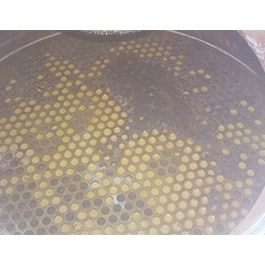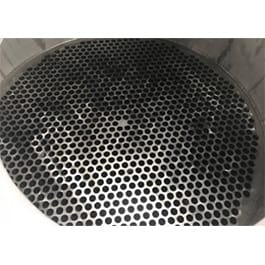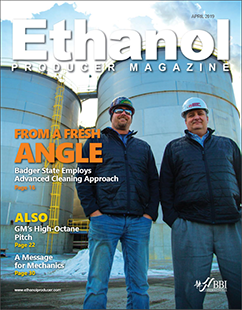_
Ecolab and Badger State Ethanol: Providing the Value of a Total Cleaning Partnership
The Situation
They knew evaporator cleaning was a pain point at almost every ethanol plant. The standard cleaning technique for fouled evaporators involved both weekly cleaning and semi-annual shut downs for hydro-blasting of clogged equipment. Ecolab developed a better process and was soon receiving calls from plants across the nation. One of those calls came from Badger State Ethanol. “We called Ecolab because we were having trouble with our evaporators fouling too quickly,” says Stephanie Schmidt, PhD, process analyst and plant chemist at Badger State Ethanol. “They sent out Zach Babcock with this amazing program and exceptional on-site consultation and the rest is history.”

The Solution
Cleaning Evaporators More Efficiently and Effectively
(See Evap 7: pre- and post-Ecolab program photos to the left)
While the chemicals Ecolab used to clean the evaporators were more expensive per ounce than the commodity caustic Badger State had been using, the new CIP process delivered far superior results at a comparable cost — while using less water and requiring less down time. “I don’t think anybody had ever talked to anyone in the industry about how to clean more effectively and efficiently,” says Stephanie. “This was a real eye opener.”

Eliminating Caustic from Fermentation Cleaning
The success of the evaporator cleaning established enough trust that BSE Operations Manager Doug Friedrich was willing to consider reducing the use of caustic in front-end cook and fermentation systems.


“Using a ton of caustic to clean is all the industry has ever known,” explained Zach. “No one’s ever helped them think about the cleaning process any differently.”
Given the 734,000 gallons held in Badger State’s fermentation tanks, the Ecolab team first conducted small tests of the alternative cleaning program in isolated mash trains from March through June of 2018.
“When I heard this idea of removing caustic, I was so skeptical,” says Stephanie. “Frankly I thought they were putting my plant at risk.” One of the immediate benefits Stephanie saw was the elimination of foam and the need to rinse after every cleaning with caustic. The acid residue from the new cleaning method was also reducing the risk of bacterial growth as the mash was fed into the fermenter. “It was actually giving the yeast a jump start by dramatically reducing the lactic and acetic acids, the production of which compete with our yeast for glucose,” said Stephanie. “We saw organic acids fall below quantification.”
Doug Friedrich also credits the new cleaning process with reduced cross contamination. “It was hard to find leaks and sometimes you’d have caustic leaking in acids and acids leaking into caustics and then leaking into the trains,” explained Doug. “Without having two different kinds of chemicals in there, you’re not cross contaminating anymore.” They also saw caustic deliveries fall from three tanks delivered weekly to one a month, a huge drop in water usage, and significant total hard savings.
“Having been such a skeptic, I was shocked that this worked — and I don’t think we could have done it without Ecolab.” said Stephanie. “They were the difference between the success and failure of moving away from caustic.”
Conversion Savings:
2 cleanings per week needed. Cleaning cycle reduced from 10 to
4 hours and zero hydroblasting shutdowns. 80% reduced cross contamination of caustic and acid valves. 10% reduction in sodium and 10% reduction in delta glycerol.
The Result
An Ongoing Plant Cleaning Partnership
Today Ecolab cleaning expertise is at work in virtually every BSE cleaning process — from evaporators and mash trains to fermenters, tricantors, syrup lines and more. Badger State Ethanol was recently named “Member of the Month” by Growth Energy1. When CEO and General Manager Erik Huschitt was asked what he considered some of the company’s main accomplishments, BSE’s “latest collaboration with Ecolab” was specifically mentioned.
"We can’t say enough great things about Ecolab,” concludes Stephanie. “Their level of interest, concern, willingness to dig in and attention to detail has been just amazing."
The admiration is mutual. “The ethanol industry looks to Badger State Ethanol as being out front in terms of innovation. Their willingness to experiment as well as their drive for continuous improvement makes them an ideal partner for Ecolab,” concludes Mike Berthoud, vice president of the AGRI and GOBS segments.
1 growthenergy.org/2018/02/01/member-week-badger-state-ethanol
_
[Badger State Ethanol] saw caustic deliveries fall from three tanks delivered weekly to one a month, a huge drop in water usage, and significant total hard savings.
Cutting Caustic:
2019 April Ethanol Product Magazine
Read more about this year-long collaboration with Badger State Ethanol in the 2019 April Ethanol Product Magazine (p.16).
_



